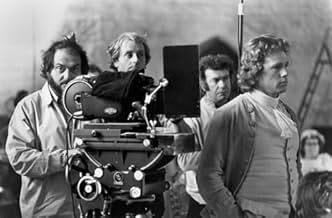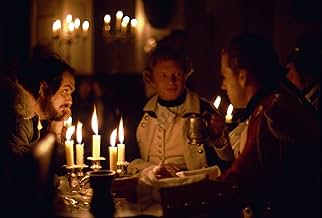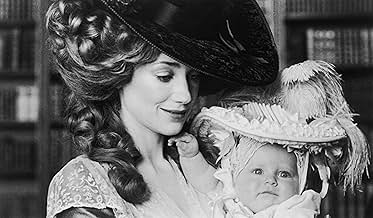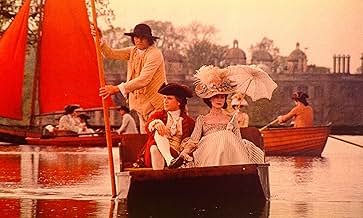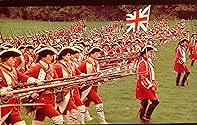Un uomo Irlandese conquista il cuore di una ricca vedova e prende il posto del suo aristocratico defunto marito nell'Inghilterra del 18esimo secoloUn uomo Irlandese conquista il cuore di una ricca vedova e prende il posto del suo aristocratico defunto marito nell'Inghilterra del 18esimo secoloUn uomo Irlandese conquista il cuore di una ricca vedova e prende il posto del suo aristocratico defunto marito nell'Inghilterra del 18esimo secolo
- Regia
- Sceneggiatura
- Star
- Vincitore di 4 Oscar
- 17 vittorie e 14 candidature totali
Hardy Krüger
- Capt. Potzdorf
- (as Hardy Kruger)
Diana Körner
- Lischen - German Girl
- (as Diana Koerner)
André Morell
- Lord Gustavus Adolphus Wendover
- (as Andre Morell)
Riepilogo
Reviewers say 'Barry Lyndon' is acclaimed for its breathtaking cinematography, intricate period details, and masterful use of natural light, often likened to fine art. It explores themes of human folly, the quest for wealth and status, and the resulting downfall. However, some criticize its slow pace, the perceived lack of emotional depth in characters, especially Ryan O'Neal's performance, and its lengthy runtime. Despite these drawbacks, many regard it as a significant artistic achievement and a standout in Kubrick's oeuvre.
Recensioni in evidenza
In terms of story this is on the surface at least, the simplest thing Kubrick ever made. However in terms of the technical aspect, it must have been one of his most challenging. The plot is basically about how greed, arrogance and ignorance can easily become the ruin of a man. The story itself is well told, but mostly quite simple as I said. The humor keeps us interested in the story, as does its undeniable visual beauty. It is not a stretch to say that this must be among the most beautiful looking films ever made. Every scene is filmed in all natural light, whether it be by sun or fire, and the landscapes and architecture handpicked by Kubrick himself are amazing. As in all Kubrick films, so much attention to small details equates to a great result in the end. Spielberg himself has called this film "possibly the most beautifully shot film in history.".
In terms of story, it's entertaining, in terms of it's technical achievement, the film is a landmark. Even for all the story's simplicity, there is a startling statement in the film that certainly can give the viewer real pause and thought. The finality of this world, the equality of all things in the end. It is certainly an interesting, powerful and very humbling down to earth observation. It is the kind of worldly observation that could perhaps lead some people to ruin, and yet lead others to strive for perfection. Perhaps that is part of Kubrick's thinking here, a Kubrickian challenge if you will, as he certainly was always an artist that was challenging his viewers. That through this observation people may become more aware of what they're leaving behind in this world...as one day, we will all equally be gone. For all the things written about this film, it is probably not nearly as unimportant of a story as many critics have said of it. Then again, critics and moviegoers alike have long been trying to catch up to Stanley, and never the other way around. 8.5/10.
In terms of story, it's entertaining, in terms of it's technical achievement, the film is a landmark. Even for all the story's simplicity, there is a startling statement in the film that certainly can give the viewer real pause and thought. The finality of this world, the equality of all things in the end. It is certainly an interesting, powerful and very humbling down to earth observation. It is the kind of worldly observation that could perhaps lead some people to ruin, and yet lead others to strive for perfection. Perhaps that is part of Kubrick's thinking here, a Kubrickian challenge if you will, as he certainly was always an artist that was challenging his viewers. That through this observation people may become more aware of what they're leaving behind in this world...as one day, we will all equally be gone. For all the things written about this film, it is probably not nearly as unimportant of a story as many critics have said of it. Then again, critics and moviegoers alike have long been trying to catch up to Stanley, and never the other way around. 8.5/10.
Martin Scorcese reportedly considers this to be Kubrick's best film. I must agree, and I would say it's his best by some fair margin. I've never seen a film with photography that even begins to approach that in Barry Lyndon. But everyone mentions the photography. The three things that most decisively set this film apart from all of Kubrick's others and really haven't been mentioned enough are its enormous heart, its uncompromising spirit, and the way it seems to suspend time over and over again, simultaneously standing still yet flowing along easily, almost breathlessly. If you watch it expecting A Clockwork Orange or The Shining, you'll be very disappointed and may end up calling it long and boring, but if you set aside an entire evening and surrender yourself totally to its magic, I swear you'll be looking for yourself in Stunland a few hours later. I's time to treat yourself to Barry Lyndon. You may be shocked at discovering what's been there for so long.
10Spleen
In fact it's one of Kubrick's most gripping pictures, with a narrative drive second only to that of "Dr. Strangelove" (and it's unquestionably a more glorious creation than, say, anything he made in the 1950s). English director Michael Powell (while attributing a similar failing to one of his own works) says that Kubrick fell into "the trap of the picturesque", but while I admire Powell as a creator, the judgment is absurd: at the VERY least, each lush image shows us people not just occupying a part of the screen but inhabiting a world, and tells us much about their relation to that world. Many shots are indeed amazing and beguile the eye, but they don't have the effect they do simply because they would make nice postcards.
THIS, I feel sure (without having read Thackeray), is the proper way to adapt a long story from novel to screen. Each scene is either allowed as much time as it needs to make its point and its impact, or it's cut altogether - you won't catch Kubrick skating too quickly over his material for no better reason than to fit it all in. The third-person narration (consisting of witty, beautifully crafted sentences - it's about time I did read Thackeray) almost performs a kind of dance with the images, gliding in just when we need it, taking a step back when we don't. (So rarely is even third-person narration used so well.) And as always, Kubrick's musical sense is unerring. My impression at the time was that I was listening to mid-eighteenth century music that gave way to pieces from the classical era as the hero started to move in higher and higher circles. I was more or less right. But then I noticed Schubert's name in the credits - and I realised with a start that I'd been listening to, had even started tapping my feet to, a Schubert piece I was familiar with, without the anachronism registering.
It's a pity Kubrick stopped making epics after this. Look at the ones he's responsible for: "Spartacus" (not a project Kubrick was fond of, admittedly, but still the most magnificent of all Roman epics) "2001" (the most magnificent of ALL epics), and "Barry Lyndon". The last of the three is by no means a poor cousin.
THIS, I feel sure (without having read Thackeray), is the proper way to adapt a long story from novel to screen. Each scene is either allowed as much time as it needs to make its point and its impact, or it's cut altogether - you won't catch Kubrick skating too quickly over his material for no better reason than to fit it all in. The third-person narration (consisting of witty, beautifully crafted sentences - it's about time I did read Thackeray) almost performs a kind of dance with the images, gliding in just when we need it, taking a step back when we don't. (So rarely is even third-person narration used so well.) And as always, Kubrick's musical sense is unerring. My impression at the time was that I was listening to mid-eighteenth century music that gave way to pieces from the classical era as the hero started to move in higher and higher circles. I was more or less right. But then I noticed Schubert's name in the credits - and I realised with a start that I'd been listening to, had even started tapping my feet to, a Schubert piece I was familiar with, without the anachronism registering.
It's a pity Kubrick stopped making epics after this. Look at the ones he's responsible for: "Spartacus" (not a project Kubrick was fond of, admittedly, but still the most magnificent of all Roman epics) "2001" (the most magnificent of ALL epics), and "Barry Lyndon". The last of the three is by no means a poor cousin.
Some movies - I wish there were more of them - simply look like a series of great paintings. This film has that look. You could freeze-frame many of the scenes and swear you were looking at a Gainsborough, a Vermeer, a Hogarth or similar work of art by one the great artists of three to five centuries ago. It's just beautiful.
For that, we have Director Stanley Kubrick and Photographer John Alcott to thank. Being a three-hour movie, there are plenty of wonderful shots to admire, too. In addition, the costumes are lavish and authentic and the scoring is notable. It's no accident that Oscars were garnered for art/set direction, cinematography, costume design and scoring. Yeah, if you enjoy classical music, you'll really enjoy the soundtrack, too, under the guidance of conductor Leonard Roseman.
Not to be overlooked is the fine acting and the interesting and underrated story. I say "underrated" because this film, from what I've read, bored a lot of people and and it was a box-office flop. That's too bad because, frankly, I found the story (outside of the first 10--15 minutes) to be fascinating. As I watched, I kept wondering what strange occurrences will happen next to the lead character, "Redmond Barry/Barry Lyndon," played beautifully by Ryan O'Neal. (For most of the movie, he's called "Redmond Barry," so I will refer to him as that.)
Overall, this was a low-key adventure story about the rise-and-fall of a "scoundrel" back in late 18th century Englishman. "Mr. Barry" is an Irishmen living in England who winds up dealing with a number of people: Irish, English, Prussian, French. His dealings with these people are bizarre at times. While he mainly is shown doing what he can to promote himself, for either monetary gain and prestige of a name and power, he's not all bad. There is a compassionate side to him, but it only shows itself in small doses. It makes him all the more interesting to watch, because you don't always know how he's going to react to his circumstances, which change radically every few years.
We witness his rise to prominence and then his fall when his "sins begin to find him out," as the Bible would describe. It's quite a roller coaster ride.
This is an emotional, involving story, and a feast for the eyes and ears. It's quite different, too, certainly not the average fare from Kubrick. I can only hope this comes out on a high-definition disc some day. Admirers of this film need to see this in all its glory.
For that, we have Director Stanley Kubrick and Photographer John Alcott to thank. Being a three-hour movie, there are plenty of wonderful shots to admire, too. In addition, the costumes are lavish and authentic and the scoring is notable. It's no accident that Oscars were garnered for art/set direction, cinematography, costume design and scoring. Yeah, if you enjoy classical music, you'll really enjoy the soundtrack, too, under the guidance of conductor Leonard Roseman.
Not to be overlooked is the fine acting and the interesting and underrated story. I say "underrated" because this film, from what I've read, bored a lot of people and and it was a box-office flop. That's too bad because, frankly, I found the story (outside of the first 10--15 minutes) to be fascinating. As I watched, I kept wondering what strange occurrences will happen next to the lead character, "Redmond Barry/Barry Lyndon," played beautifully by Ryan O'Neal. (For most of the movie, he's called "Redmond Barry," so I will refer to him as that.)
Overall, this was a low-key adventure story about the rise-and-fall of a "scoundrel" back in late 18th century Englishman. "Mr. Barry" is an Irishmen living in England who winds up dealing with a number of people: Irish, English, Prussian, French. His dealings with these people are bizarre at times. While he mainly is shown doing what he can to promote himself, for either monetary gain and prestige of a name and power, he's not all bad. There is a compassionate side to him, but it only shows itself in small doses. It makes him all the more interesting to watch, because you don't always know how he's going to react to his circumstances, which change radically every few years.
We witness his rise to prominence and then his fall when his "sins begin to find him out," as the Bible would describe. It's quite a roller coaster ride.
This is an emotional, involving story, and a feast for the eyes and ears. It's quite different, too, certainly not the average fare from Kubrick. I can only hope this comes out on a high-definition disc some day. Admirers of this film need to see this in all its glory.
Barry Lyndon (1975) has to be Stanley Kubrick's most realized project that he has ever taken. A big task for the maverick director. For a film like this to be made during the free wheeling seventies had to take some big stones. One must admire Mr. Kubrick for even trying to produce and direct such a complex and expensive film that had all the ear markings of a financial and personal disaster. Not only did Kubrick manage to out do his last epic "2001" but he has created a movie that not only showcases the untapped acting abilities of Ryan O'Neil, but a beautifully lensed film that uses minimal lighting , gorgeous sets, perfect balance, positioning and meticulous timing. I have never seen such a magnificent film such as this one. Every shot and frame plays out like an eighteenth century oil painting.
A young Irish man of lower class has the strangest quirk of luck. After participating in an illegal duel, young Barry is forced to flee from his home village. After being accosted by some gentlemanly highway robbers, Barry winds up cross country and becomes a conscripted soldier. Rising in rank, Barry is sent to fight in the Seven's Year War. Whilst in battle he watches his friends and fellow soldiers being slaughtered in combat due to poor tactics and leadership. Having enough of this life of hardship and struggle, Barry uses his god given talents to do what he has to do in order to survive and become a man of proper social standing.
I was very impressed with this movie. I've put off watching this film until recently. Some have told me how long and boring this movie was. Others have said it was pretty self serving and not worth watching. But after seeing part of it on T.C.M., I just had to find a copy of my own. The film is over three hours in length but they go by very quickly because Barry's story is so captivating. Kubrick poured his heart and soul into this film. The results are on the screen. He's clearly a master film maker. His reputation is cemented forever with this movie. Ryan O'Neil impressed the hell out me with his role as Barry Lyndon. He gives the character some dignity and depth that no other actor could have possibly given to the title role.
Overall I would have to give this film one of my highest recommendations. This is one of my top ten films of all time. If people tell you not to watch this masterpiece ignore them. I advise you to get a copy and enjoy. For a film like this you need to set aside a weekend afternoon to fully appreciate a film such as this. Believe me you will not regret it.
Highest recommendation possible.
It doesn't matter whether you watch it on D.V.D. or V.C.D. because the transfers are excellent on either format.
A young Irish man of lower class has the strangest quirk of luck. After participating in an illegal duel, young Barry is forced to flee from his home village. After being accosted by some gentlemanly highway robbers, Barry winds up cross country and becomes a conscripted soldier. Rising in rank, Barry is sent to fight in the Seven's Year War. Whilst in battle he watches his friends and fellow soldiers being slaughtered in combat due to poor tactics and leadership. Having enough of this life of hardship and struggle, Barry uses his god given talents to do what he has to do in order to survive and become a man of proper social standing.
I was very impressed with this movie. I've put off watching this film until recently. Some have told me how long and boring this movie was. Others have said it was pretty self serving and not worth watching. But after seeing part of it on T.C.M., I just had to find a copy of my own. The film is over three hours in length but they go by very quickly because Barry's story is so captivating. Kubrick poured his heart and soul into this film. The results are on the screen. He's clearly a master film maker. His reputation is cemented forever with this movie. Ryan O'Neil impressed the hell out me with his role as Barry Lyndon. He gives the character some dignity and depth that no other actor could have possibly given to the title role.
Overall I would have to give this film one of my highest recommendations. This is one of my top ten films of all time. If people tell you not to watch this masterpiece ignore them. I advise you to get a copy and enjoy. For a film like this you need to set aside a weekend afternoon to fully appreciate a film such as this. Believe me you will not regret it.
Highest recommendation possible.
It doesn't matter whether you watch it on D.V.D. or V.C.D. because the transfers are excellent on either format.
Lo sapevi?
- QuizProduction was moved from Ireland to England after writer, producer, and director Stanley Kubrick received word that his name was on an I.R.A. hit list for directing a movie featuring English soldiers in Ireland. Consequently, several scenes were dropped.
- BlooperThe narrator states, early on, "About this time, the United Kingdom was in a state of great excitement". The United Kingdom came into being in 1801, when it merged with the Kingdom of Ireland, before which it was known merely as the Kingdom of Great Britain. In fact the Act of Union of 1707, which joined England and Scotland, refers to "the United Kingdom of Great Britain" or "the United Kingdom" throughout the text. "United Kingdom" was in common use at the time of the film.
- Citazioni
Title card: [End title card] EPILOGUE
Title card: It was in the reign of George III that the aforesaid personages lived and quarreled; good or bad, handsome or ugly, rich or poor they are all equal now
- Versioni alternativeThe 2011 Blu-ray plastered the opening Saul Bass variant of the Warner Bros. Pictures logo with the black and white WB shield.
- ConnessioniEdited into Hai-Kubrick (1999)
- Colonne sonorePiano Trio in E-flat, Op 100 (second movement)
Composed by Franz Schubert
piano: Anthony Goldstone
cello: Moray Welsh
violin: Ralph Holmes
I più visti
Accedi per valutare e creare un elenco di titoli salvati per ottenere consigli personalizzati
- How long is Barry Lyndon?Powered by Alexa
- Why do the gamblers wore heavy makeup?
- What is a "plug of tow" or "plug of toe" referred to after the first duel?
- Is this movie based on a novel?
Dettagli
- Data di uscita
- Paesi di origine
- Lingue
- Celebre anche come
- Баррі Ліндон
- Luoghi delle riprese
- Aziende produttrici
- Vedi altri crediti dell’azienda su IMDbPro
Botteghino
- Budget
- 11.000.000 USD (previsto)
- Lordo in tutto il mondo
- 284.426 USD
- Tempo di esecuzione3 ore 5 minuti
- Colore
- Mix di suoni
- Proporzioni
- 1.66 : 1
Contribuisci a questa pagina
Suggerisci una modifica o aggiungi i contenuti mancanti





